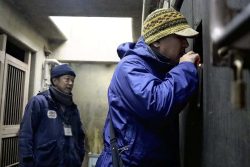12:30 JST, June 14, 2021
The explosion in novel coronavirus infections in India has had serious ramifications, from the spread of variants to delays in distributing vaccines to developing countries. There are many lessons that the international community can learn from India’s situation.
In May, the number of people in India newly infected with the novel coronavirus exceeded 410,000 per day — the highest numbers in the world.
As a result of large-scale lockdowns, the number of infections has since decreased to 100,000 per day. But the number of medical workers, hospital beds and ventilators, among others, are still in short supply. The number of deaths per day remains high at several thousand.
Indian Prime Minister Narendra Modi declared victory in January, claiming that infections had been contained. In response to China’s “vaccine diplomacy,” the Indian prime minister also had worked to offer free vaccines to neighboring countries, but infections surged rapidly in his country in March.
This is believed to have been caused by the millions of people crowding during a religious festival for Hindus, who are Modi’s support base, and the many maskless people gathering for local assembly election rallies.
The fact that India did not implement lockdowns at this stage was an additional blow. India’s economic growth rate for the last fiscal year was minus 7.3%, its first contraction in 41 years. The Indian administration may have been concerned about further damage to the economy, but it surely won’t be allowed to escape criticism.
In response to the decline in his approval rate, Modi has strengthened crackdowns on anti-government activities and restrictions on social media. This runs counter to the nation’s reputation for being “the world’s largest democracy.” Shouldn’t the first priority for India be to take thorough measures to prevent infection and reinforce the medical system?
The large-scale outbreak in India, with its poor sanitation and fragile health care system, indicates that developing countries in Africa and Southeast Asia, which have similar living conditions, may become the flash points for new outbreaks or hotbeds for future variants.
The delta variant that was first detected in India has spread to 60 countries around the world. Another variant has begun to rage in Vietnam. There is an urgent need to strengthen support for developing countries.
India had planned to supply half of the 2 billion doses of vaccine provided through the international COVID-19 vaccine distribution framework COVAX this year. However, India is running out of vaccines for its own use and has banned the export of vaccines, causing delays to the supplying of COVID-19 vaccines to developing countries.
Speeding up vaccine distribution and increasing the vaccination rate in developing countries will benefit the entire world. Leading nations should put more energy on providing funds and technology to ensure wider distribution.
Japan has on its own supplied vaccines to Taiwan. The central government is considering providing vaccines to Southeast Asia and Pacific island nations as well. While accelerating its domestic vaccination program, Japan also needs to steadily provide support overseas.
— The original Japanese article appeared in The Yomiuri Shimbun on June 13, 2021.
"Editorial & Columns" POPULAR ARTICLE
-

Artificial Intelligence Expands Possibilities for Foreign Language Learners
-

Build Intellectual, Physical Strength, As Well As Communicative Power / Japan Should Move from Beneficiary to Shaper of World Order
-

Global Economy in Turmoil: Prevent Free Trade System from Going Adrift / Risks to Financial Markets Must Be Heeded
-

Japan-China Strain Set to Persist as Beijing Officials Self-Interestedly Bash Tokyo; Takaichi Unlikely to Back Down
-

French and German Ambassadors to Japan Call for Democracies to Unite in Defense against Russian Disinformation
JN ACCESS RANKING
-

As Chinese Tourists Shun Japan, Hotels and Stores Suffer
-

Core Inflation in Tokyo Slows in December but Stays above BOJ Target
-

BOJ Gov. Ueda: Highly Likely Mechanism for Rising Wages, Prices Will Be Maintained
-

Osaka-Kansai Expo’s Economic Impact Estimated at ¥3.6 Trillion, Takes Actual Visitor Numbers into Account
-

Japan Govt Adopts Measures to Curb Mega Solar Power Plant Projects Amid Environmental Concerns






















